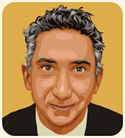I, like many others, was one of those who sent an e-mail to the U.S. State Department inquiring about the visa status of a number of Cuban economists coming to the Latin American Studies Association (LASA) last week in Chicago. Most, though not all of them, received visas after becoming lodged in the State Department’s labyrinthine processes.
Sadly, I couldn’t have done the same for Manuel Cuesta Mora, a Cuban human rights activist who requested a visa from his government to travel to the same LASA conference. The Cuban government denied his visa, and I don’t have much pull with those guys, unfortunately.
Denied. [But the Joke’s on the Cuban Government]
The news of Cuesta Morua’s visa denial arrived just before the LASA conference started. According to the Cuban government the reason for Cuesta Morua’s inability to leave his country was that he had previously been arrested for participating in a peaceful protest in late January 2014, expressing citizen opposition to yet another regional platitudinous summit that failed to recognize the democratic values it purports to uphold.
In this case it was the Community of Latin American and Caribbean States (CELAC) summit held in Havana. Dozens of activists were rounded up by the Cuban government to preempt any embarrassing expressions of “democratic-ness.” And most Latin American presidents didn’t say a word, though many have benefitted from the sort of democratic openness or its defense under other less-leftist regimes.
At the same time, well-meaning U.S. citizens like myself were bombarding the State Department with indignant e-mails about the status of a selected few Cuban citizens. All the while, the Cuban government was carefully crafting its argument for denying Cuesta Morua’s visa to attend the academic conference in Chicago.
The reason? The specious charges over creating civil disturbance during Cuba’s CELAC coming out party.
As a result, a well-respected, independent thinker was not able to attend the premier hemispheric academic conference on the Americas.
How many of those who defended the rights of officially designated Cubans to get a U.S. visa to travel to the LASA conference will speak up against the Cuban government’s denial of Cuesta Morua’s request?
The simple minded will argue that because the Castro government denied its citizens access to an academic conference, the U.S. policy of people-to-people contact is a failure and should be shut down because the Cuban state gets to determine who should travel to the U.S.
Quite the opposite.
For one, Cuesta Morua’s absence was a cause célèbre, more than if he had been present. There were notices and letters scattered around tables (sometimes along with rallies for the Cuban Five). And while his panel wasn’t well attended (he wasn’t there!), someone else read his paper.
Ironically, if the Cuban government had let him attend, he would have been just another Cuban, attending the conference, presenting and—even, heaven forfend!!—interacting with others at the conference. The impact of Cuesta Morua’s absence proves the point: U.S. policy should continue to allow—even expand—the opportunities for these sorts of interactions.
But to make it a truly democratic exchange, those who support official Cuban travelers should—must—demand equal treatment for all Cubans.
The Challenges and the Challenge
Will the Cuban government continue to deny those democratic activists it deems to be enemies of the state visas? Sure. But the very denial speaks volumes about the Cuban government, in ways that are too often overshadowed by the polarized debate over the U.S. embargo on Cuba and some hardliners desire to prevent the Cuban regime from making decisions.
Here’s the point: the U.S. shouldn’t be in the business of denying Cuban citizens the rights that the Cuban government should protect, but is not. Often we hear the argument that a policy change shouldn’t be implemented because “Castro wouldn’t allow it.”
It’s a spurious, illogical argument.
Let the U.S. government do what it does best (support freedom) and let the Castro government do what it does best (suppress freedom). The U.S. should not be an obstacle to communication, exchange and contact with the Cuban island. If the Castro government wants to deny its citizens cell phones, that’s the business of the Cuban government. If the Castro government wants deny its citizens access to credit to start business, that’s the business of the Cuban government.
The business of the U.S. government should be forcing the Cuban government to make those decisions, not preventing them.
Belly Up
Will those who pushed so hard for the Cuban economists to speak their mind in Chicago and New York make a plea for the right of Cuesta Morua to attend an academic conference with his fellow (though far more connected) citizens? Probably not. But that shouldn’t—as many on the right will argue—be an excuse to oppose the small gestures of U.S. seeking to establish a more stable relationship with the island nation.
Ultimately, the U.S government’s moral authority hinges on what it is willing to offer to other countries in terms of openness, technology and communication. While the Cuban government will always limit the activities of those it deems to be political opponents, the U.S. shouldn’t act by predicting its reactions (and thereby preclude its opponents from making tough decisions).
The responsibility of those who advocated for the U.S. to grant visas to the official Cubans should be willing to step up and denounce the denial of visas to “non-official Cubans.” Doing so is important so that pro-embargo advocates don’t get a corner on human rights in Cuba. Ultimately, most of us are supporting the Obama policy or even future changes because we believe they better promote human rights and democratization in Cuba, but we need to show it.
So to quote John Belushi in Animal House- Who’s with me here? Please, let’s defend Cuesta Morua’s right to travel to Chicago.




